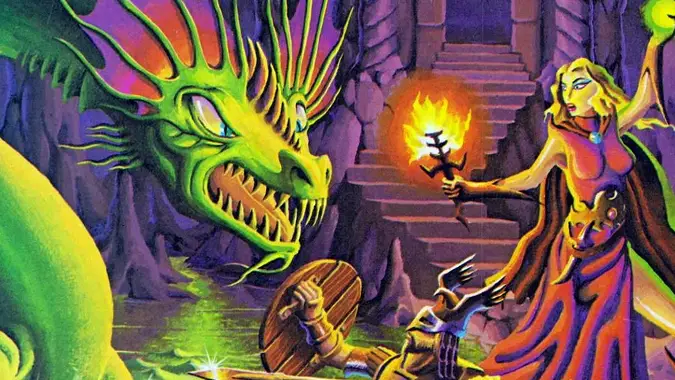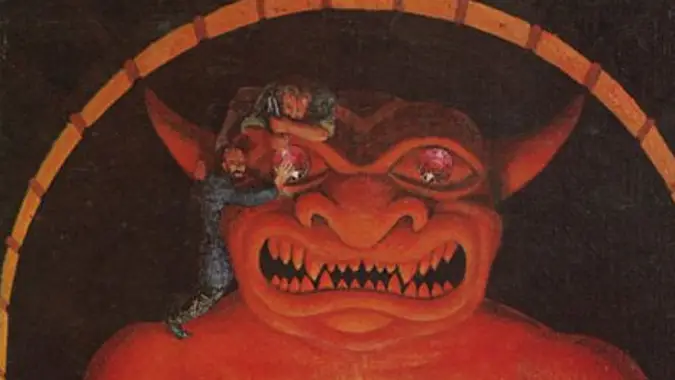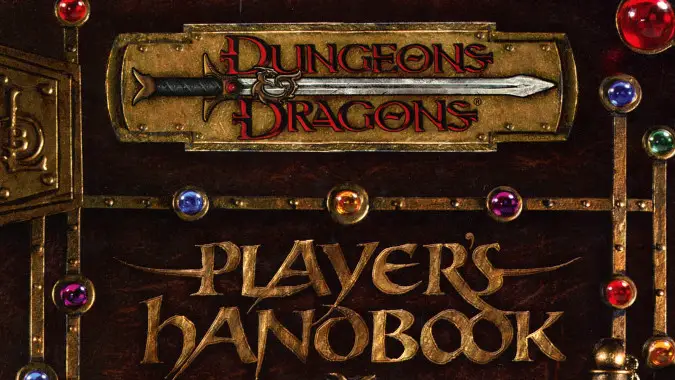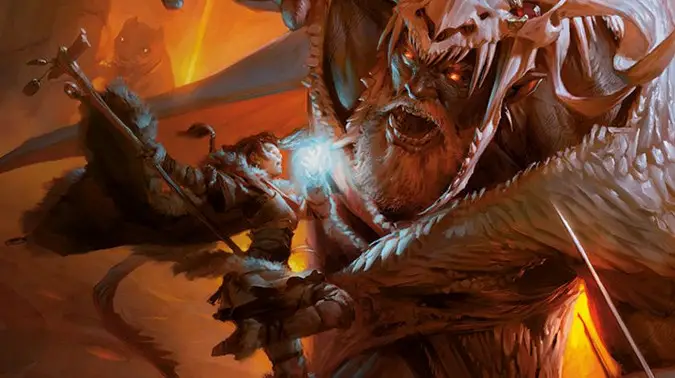Off Topic: Edition wars in RPGs are pointless and miss the true point of playing those games

Okay, let me just get it out of the way up front — I’ve never liked any RPG published as much as I liked the boxed Dungeons and Dragons basic set when I got it in the early 80s. I was between ten and twelve years old, and some really bad and awful things were happening in my life, and that box set was like a friend. I used that thing so hard that the box actually disintegrated, and my red basic rules book was falling apart, so I used a Trapper Keeper to hold all the pages.
By the standards of modern RPG design it was terrible. But I bought the D&D Rules Cyclopedia when it came out, collecting all the rules from all the sets from Basic to Expert to Companion to Master, and I played them extensively. I only really made the switch to Advanced Dungeons and Dragons because all the kids who played D&D played it instead of the rules from the Basic and other sets, and converting characters was a pain in the butt. D&D has Elves, Dwarves, and Halflings as both a race and a class — every Halfling was basically a Thief, but weird and weaker. AD&D was a much more balanced, much more flexible, and just plain better system.

The oldest of old days
But I loved those box sets. They were how I got into D&D. I resisted the change, I clutched those weird old rules with their weird old artifacts, and when the 3rd Edition of Dungeons and Dragons came out in 1999/2000, I found myself in a world where the D&D/AD&D split no longer existed.
Except, well, they still did. The fact that Wizards of the Coast — at that time (and to this day) the holder of the D&D name and properties — wasn’t publishing adventures for either of these systems anymore didn’t make those books suddenly cease to exist, and the rise of print on demand sites means that you can buy (as an example) older editions of these games right now.
As I write this post in 2019, tabletop RPG play is undergoing a renaissance after the boom of the early 2000s went bust. Streaming RPG shows like Critical Role have done more to demystify what the game actually is and how it works than any amount of new editions could have, and we’re in an era when you can catch a show on YouTube or Twitch and watch people get together and play an RPG any time you want, whether streamed or recorded, with wildly varying levels of role playing and dice rolling to suit your tastes. If you enjoy watching people who are trained and professional actors play, and go all out with their improve and role playing? You can do that. And if you like listening to a game where people who’ve never acted a day in their life and who don’t know how to play very well give it their best shot? You can do that too (he says, looking at our podcast feed meaningfully).

Eventually we are all Grognards
But along with that renaissance, there are always Grognards. The Reddit thread explains it pretty well from a Grognard POV, but to break it down super-simplistically, a Grognard is someone who likes things the way they used to be and resists change. If you stay in the hobby long enough, you’ll eventually confront in yourself a Grognard sensibility or two, and it should be said that there’s nothing wrong with being a Grognard, if you and the people you’re playing with enjoy that. When Grognard tendencies get bad is when they are taken to the extreme and used to justify exclusion and gatekeeping. It’s fine to prefer an older edition or system, and it’s bad when you insist that anyone who likes a new edition or system or way of playing isn’t a real gamer — they’re doing it wrong, that thing they like is awful, and that they’re awful for liking it.
When 3rd Edition D&D came out, a lot of AD&D partisans were infuriated, and refused to play it. And that was their right — it’s not like their AD&D books went anywhere, heck, some companies even created their own games that preserved a lot of the AD&D rules before evolving into what they are today. To use a more modern example, when 3e came out, I embraced it, and I own to this day a lot of the products Wizards of the Coast put out for it. So much so, that when 4th Edition D&D was released and I didn’t care for it? I didn’t play it. I kept playing 3e.

The most pointless of pointless arguments
When you combine this with the wide assortment of tabletop RPGs that aren’t and have never been D&D, and which also have multiple editions that players hotly debate — seriously, try talking about Shadowrun sometime, or the versions of Talislanta that exist and which one is the best if you want to find yourself drowning in debtae sometime — I think it’s important to really grasp the difference between preference and objective statements. Especially when it comes to editions of an RPG, and when a publisher switches to a new one.
Edition wars are hotly contested, fought on forums and blogs and Tumblr posts and Twitter, and are about as unimportant as any discussion in what is ultimately supposed to be a fun pastime can possibly be. Yes, I’m saying it now — Edition wars in TTRPG spaces are even less important than the old debate about dice-less roleplaying systems. It’s fine if you have a preference. It’s fine if you express that preference, and give examples as to why you hold it. Your opinion is valid. It’s when we see people going well beyond opinion and into personal attacks and slagging on not just different editions of the games, but attacks on the people who play those editions, that it gets harmful.
If you love 3rd Edition D&D and hated both 4th and 5th Edition? Fine. Play what you like. If you loved AD&D and hate everything since? That is your choice, and there’s plenty of stuff out there for you. If you loathe D&D, would never play any of it, and are currently in the tenth year of your World of Darkness campaign, or even a really complex Empire of the Petal Throne game you’ve been running since the mid 70s? As long as you understand that this is just for fun, that these are games and your preference doesn’t serve as a value judgement of other people who don’t share it, you’re golden.

You are never over, and neither are old games
One problem I see a lot when we have these kind of arguments in gaming is the idea of abandonment. The fact is, people get attached to their RPG of choice. Like I said, I own a lot of D&D 3e stuff, and when Wizards went to 4th Edition, I was left feeling like I was holding the bag. None of my stuff was current anymore! I couldn’t use any of it!
Of course, that was foolish. Of course I could use it. I still can to this day. I can pick up a copy of a 3e book and flip through it and steal ideas for my current games just fine. It’s an understandable idea, that you’ve invested a lot of time and money in a game and now they’re leaving you behind, but it’s not real. Game companies will inevitably release new editions of their games, both to make money and because the state of the hobby advances and new innovations are made. Game designers are a creative bunch who spend a lot of time thinking about rule systems and how to do certain things with them, and they inevitably come up with new ways to approach old problems. A new edition is a way to sit down and collate all of those new design ideas, to start from scratch and make a cohesive whole rather than just play Jenga with updates and supplements.
And if you don’t like a new edition? Don’t play it. Your old books will work fine. This isn’t like MMOs, where companies pulling support means the game is gone — if City of Heroes/Villains had been a pen and paper game instead of an MMO? People would still be playing it today, because books never stop working just because a company stops making new ones.
So yes, eventually we all become old soldiers in the RPG space. Be the best kind, the one who serves as a mentor, the old grizzled, “Kid, I seen things, I seen when Elves were a class and everybody wanted a sanity mechanic in their games” flashback-having coot who helps them get grounded in this hobby. Love whatever old crusty game you like. Constantly try and get people to pick up Nexus, the Infinite City even though you’re the only person who loves that game anymore. But don’t attack people for liking something new, or making something you don’t think is as good as your old favorite. Keep playing what you love and let them play what they love.
Please consider supporting our Patreon!
Join the Discussion
Blizzard Watch is a safe space for all readers. By leaving comments on this site you agree to follow our commenting and community guidelines.
 @MatthewWRossi
@MatthewWRossi



